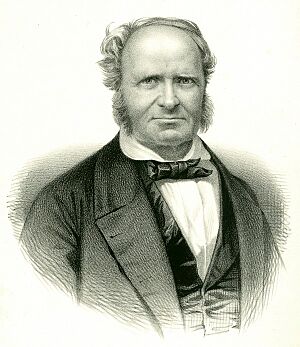Abraham Emanuel Fröhlich facts for kids
Abraham Emanuel Fröhlich (born February 1, 1796, died December 1, 1865) was a famous Swiss poet. He is best known for his amazing fables, which are like short stories with a moral lesson. He also wrote heroic poems and religious songs.
A Poet's Life
Abraham Emanuel Fröhlich was born in a town called Brugg in Aargau, Switzerland. His father was a teacher there.
He studied theology at a university in Zürich. Theology is the study of religious beliefs. In 1817, he became a pastor, which is like a minister or priest in a church. He went back to his hometown, Brugg, to teach for ten years.
Later, he became a professor of German language and literature in Aargau. But he lost this job around 1830 because of political disagreements. After that, he became a teacher and rector (head teacher) at a college. He also worked as an assistant minister at a local church. He passed away in Baden, Aargau.
Fröhlich is most famous for his two long poems about heroes: Ulrich Zwingli and Ulrich von Hutten. People also loved his fables, which are often compared to those by other great writers like Hagedorn and Lessing.
His Writings
A collection of all his works was published in five books in 1853.
Here are some of his main works:
- 170 Fabeln (170 Fables) (1825)
- Schweizer Lieder (Swiss Songs) (1827)
- Des Evangelium St. Johannis, in Liedern (The Gospel of St. John, in Songs) (1830)
- Elegien an Wieg und Sarg (Elegies to Cradle and Coffin) (1835)
- Die Epopöen (The Epic Poems) (1840)
- Ulrich Zwingli (1840)
- Ulrich von Hutten (1845)
- Auserlesene Psalmen und geistliche Lieder für die Evangelisch-reformirte Kirche des Cantons Aargau (Selected Psalms and Spiritual Songs for the Evangelical-Reformed Church of the Canton Aargau) (1844)
- Über den Kirchengesang der Protestanten (On the Church Singing of Protestants) (1846)
- Trostlieder (Songs of Comfort) (1852)
- Der Junge Deutsch-Michel (The Young German Michael) (1846)
- Reimsprüche aus Staat, Schule, und Kirche (Rhyming Sayings from State, School, and Church) (1820)
See also
 In Spanish: Abraham Emanuel Fröhlich para niños
In Spanish: Abraham Emanuel Fröhlich para niños
 | Bayard Rustin |
 | Jeannette Carter |
 | Jeremiah A. Brown |


